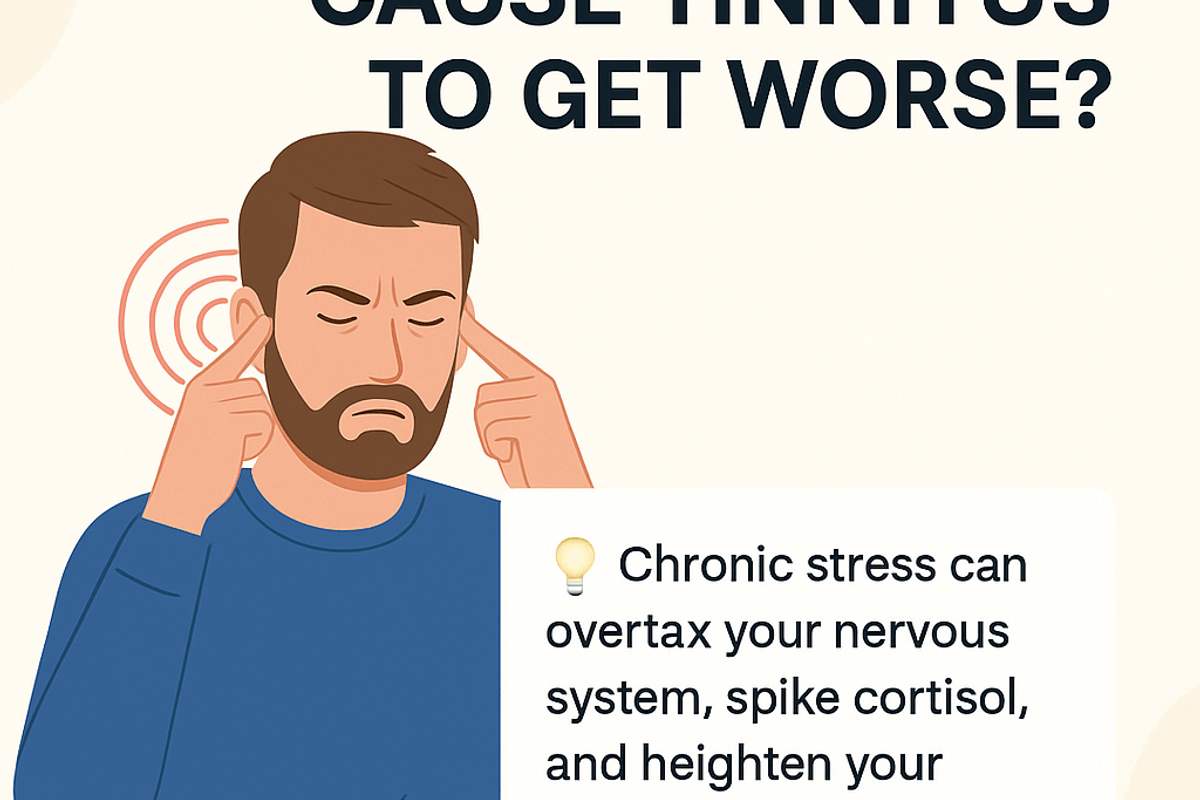This article contains affiliate links. If you purchase through these links, we may earn a commission at no extra cost to you. Full disclosure
If your tinnitus flares when you’re stressed - you’re not imagining it. Stress worsens ringing in the ears by activating your nervous system, raising blood pressure, and heightening auditory sensitivity.
📋 Our Research-Backed Recommendation
After reviewing the research on tinnitus and auditory health, this supplement combines clinically-studied ingredients that target the mechanisms discussed above. Backed by a 60-day money-back guarantee.
*Affiliate link - we may earn a commission at no cost to you. Full disclosure
How Stress Affects Your Auditory System

When you’re stressed, cortisol and adrenaline flood your system, triggering a chain reaction:
Get Weekly Health Tips
Join thousands getting evidence-based wellness insights delivered free every week.
🔒 No spam. Unsubscribe anytime.
- Blood flow changes - Constricted vessels reduce oxygen to the inner ear
- Neural hyperactivity - Your brain’s auditory center goes into overdrive
- Muscle tension - Jaw clenching and neck tension affect ear structures
- Inflammation - Chronic stress damages delicate ear cells
The Tinnitus-Stress Feedback Loop
Stress makes tinnitus louder, and louder tinnitus increases stress. This feedback loop explains why tinnitus spikes during anxiety, work pressure, or sleep deprivation. Breaking it means addressing both sides at once.
Stress Management for Tinnitus Relief

Deep breathing - The 4-7-8 technique (inhale 4s, hold 7s, exhale 8s) activates your parasympathetic nervous system within minutes.
Sound therapy - White noise, nature sounds, or soft music mask the ringing and retrain your brain’s auditory focus.
Exercise - 20-30 minutes of walking or yoga daily improves inner ear circulation and lowers cortisol.
Sleep hygiene - 7-8 hours in a cool, dark room. Poor sleep is the #1 tinnitus trigger for many people.
Mindfulness - Even 10 minutes daily reduces the brain’s hyperactive response to phantom sounds.
Daily Tinnitus + Stress Relief Checklist
- ☐ 10 minutes deep breathing or meditation
- ☐ 20+ minutes physical movement
- ☐ Background sound therapy during quiet hours
- ☐ Limit caffeine to 1 cup before noon
- ☐ Wind-down routine 30 minutes before bed
🧪 What Our Research Points To
After analyzing the studies on tinnitus and auditory nerve health, one supplement stands out for its evidence-based approach.
- Clinically-studied ingredients targeting auditory nerve health
- Dosages aligned with published research
- 60-day money-back guarantee - zero risk to try
See Full Ingredient Breakdown →
No subscription required · Affiliate disclosure
FAQ
Can stress actually cause tinnitus?
Stress doesn’t usually cause tinnitus directly, but it significantly worsens existing tinnitus and can trigger first episodes in vulnerable individuals.
Why does tinnitus get louder when I’m anxious?
Anxiety activates fight-or-flight, increasing neural activity in auditory processing areas. Your brain literally amplifies the phantom signal.
Can calming down reduce the ringing?
Yes. Breathing exercises, meditation, and sound therapy measurably lower tinnitus perception in most people.
What’s the fastest way to stop a tinnitus spike?
The 4-7-8 breathing technique plus background white noise typically calms a spike within 10-15 minutes.
About Us: The YWHL Editorial Team researches health, wellness, and nutrition topics by analyzing published studies and clinical data. Our goal is to help readers make informed decisions about their health. This content is for educational purposes only - always consult your healthcare provider before starting any supplement or health program.
Some of the links on this site are affiliate links, which means we may earn a commission if you click through and make a purchase, at no additional cost to you. None of the information in this blog is medical advice. It is simply for educational purposes only.
📚 Research Sources
⭐ Struggling with Tinnitus?
Discover evidence-based approaches and natural supplements that may help manage tinnitus symptoms and support auditory health.
*Individual results may vary. This site contains affiliate links.

